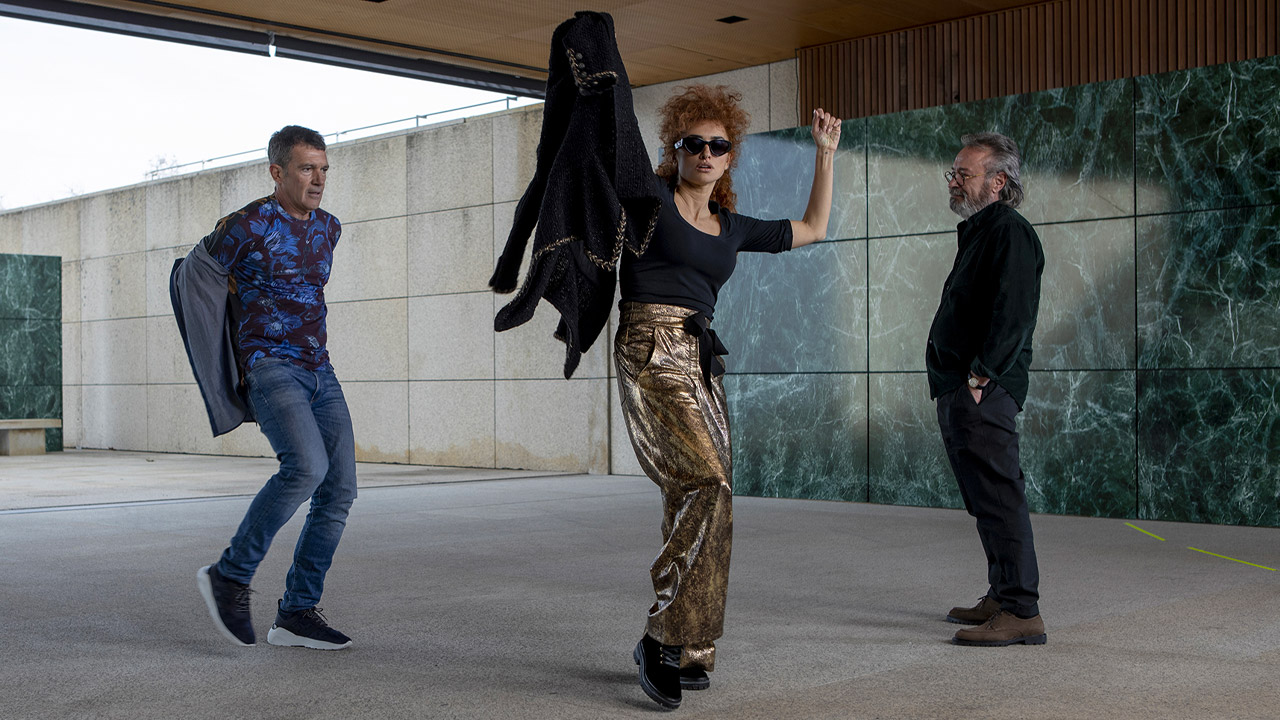
Competencia Oficial (Official Competition) is an irresistible Spanish-Argentine black comedy film directed by Gastón Duprat & Mariano Cohn, from a screenplay by Duprat, Cohn, and Andrés Duprat. It stars Antonio Banderas, Penélope Cruz and Oscar Martínez, who also produced this irreverent cinematic work.
After The Illustrious Citizen, presented at the Venice Film Festival in 2016, the duo of directors Mariano Cohn and Gastón Duprat returned in the 2021 Lido competition, with a dark humoured comedy that conquered a place also in the Toronto Film Festival line-up.
The gallows humour is palpable from the very start when Humberto Suárez (José Luis Gómez), an octogenarian entrepreneur, is trying to find the right initiative to boost his legacy. He settles for the production of a grand film and, knowing nothing about cinema, he relies on internationally acclaimed director Lola Cuevas (Penélope Cruz) to adapt a text for which he has acquired the rights. Cuevas in turn hires two prominent actors, Iván Torres (Oscar Martínez, awarded with the Volpi Cup) and Félix Rivero (Antonio Banderas), in the role of the two rival brothers.

The two actors have opposite approaches. Iván comes from the theatre and is intellectually sophisticated, to the point of coming across as a snob. Félix belongs to the world of gaudy blockbusters. Their private lives echo their professional paths. Iván, although his first marriage failed, currently has a solid relationship with his cerebral second wife. Félix on the contrary is a philanderer who collects women in the same way he accumulates flashy accolades. The way they approach acting reflects how they navigate through life, one digs deep in the character’s motivations to identify with the role, the other delivers his lines with conviction to get it over and done with.
The unabashed furore of their juxtaposing personalities provokes moments of friction, that are heightened to the extreme by the bizarre directorial ploys that Lola comes up with during rehearsal. Along the way things get out of hand and the morbid humour reaches its peak with an unexpected turn of events.

The Cruz-Banderas-Martínez trio is majestic. Each one conveys an alluring outlandishness. They are all antiheroes in their own way. Lola is anarchic in putting to the test the ego of her actors, whilst being extremely empathetic towards them. Félix is flamboyantly narcissistic. Iván, although less bombastic than his antagonist, is equally conceited — sustained by his cultural expertise.
Lola acts as a magnifying glass and narrator not only of the film she is making but also of the film she is starring in. Her disenchanted personality allows her to ponder, dissect, analyse, the mise-en-scène that comes to life before our eyes. She is a provocative in her ways and takes delight in recurring to tension as a stimulus for her competitive thespians. Lola is the spokesperson for filmmakers who still believe in the power of cinema, and through her extravagant approach many issues start to appear from the entertainment world.
In fact, Official Competition doesn’t merely investigate the relationship between the actor and his role, but further expands to the lifespan of a cinematic oeuvre. As the story progresses, what comes to the surface is the assembly line procedure in which a film gets packaged and shared with the world, mainly through the festival circuit. Thus the title Official Competition, uncannily determines the fictional and real fate of the picture by Gastón Duprat & Mariano Cohn: it becomes a film within a film at a festival (the fictional one depicted in the movie) within a festival (the real 78th Venice Film Festival where it had its world premiere).
Extreme comedy is at the service of constructive, moral criticism for the entire collectivity. This parable on the world of art, amidst cachinnation and a bittersweet twist of events, turns out to be a discerning musing on the role of creative expression, as well as the universal and ruthless competition from multiple points of view.
Official Competition is cunning in resorting to the grotesque for its social critique. The comedy is dark, shrewd, and piquant. The delightfulness of political incorrectness makes the public laugh cathartically to all the surreal circumstances that provide a meta-level about the behind-the-scenes of moving images. The existential reflection blends with elements of the thriller genre, where each performer plays a caricature that is functional for the socio-anthropological examination.
Final Grade: A

